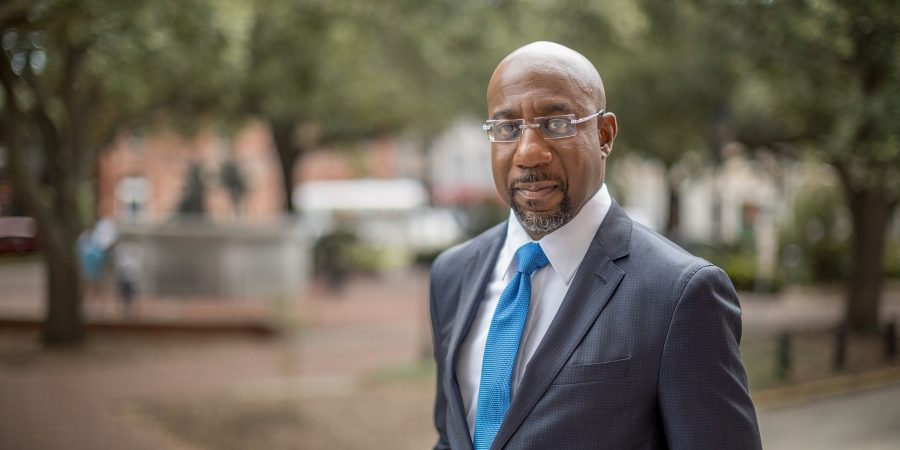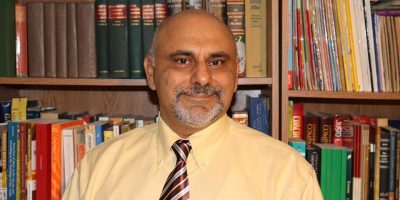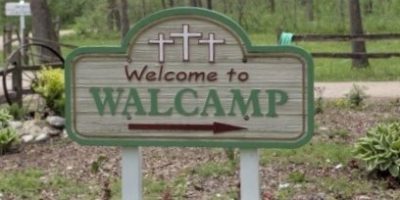“I say I’m stepping up to my next calling to serve, not stepping down from the pulpit.”
Rev. Raphael Warnock considers vote sacred as pastor and Senate candidate

Then there is the Rev. Raphael Warnock. In the days before Georgia voters gave Warnock, a Democrat, a seven-point victory and sent him into a runoff with GOP incumbent Sen. Kelly Loeffler, the pastor found time to participate in Ebenezer’s virtual worship services. In the prerecorded services, he immediately began cajoling viewers to get on social media to invite others to tune in.
“Maybe start a watch party,” he suggested, before making an announcement about free COVID-19 tests available on the church’s campus.
Warnock appeared online at his pulpit the following Sunday, looking crisp but relaxed behind “this sacred desk.” His runoff campaign was already underway, but he exuded the same ease he has shown over months of hard campaigning. (Inoculating himself against the kind of mudslinging Loeffler engaged in with her closest Republican rival, Doug Collins, in the primary, Warnock ran a parody negative ad against himself last week in which he admitted loving puppies.)
If the bald, bespectacled 51-year-old is conflicted about choosing between his prestigious pulpit or becoming Georgia’s first-ever African American senator, he doesn’t show it. Despite a direct question sent to his campaign by email, he hasn’t even made clear whether he will quit the job he has held since 2005 if he goes to Washington.
“It’s unusual for a pastor to get involved in something as messy as politics, but I see this as a continuation of a life of service: first as an agitator, then an advocate, and hopefully next as a legislator,” Warnock responded to Religion News Service on Wednesday through his campaign. “I say I’m stepping up to my next calling to serve, not stepping down from the pulpit.”
RELATED: Raphael Warnock, heir to MLK’s pulpit, heads for runoff for Georgia Senate seat
Indeed, it’s not always clear which role Warnock is inhabiting, pastor or politician. In church and on the campaign trail, he has compared voting to praying with stump-speech familiarity.
“We must vote because a vote is a kind of prayer about the kind of world that you want to live in,” he said at a Nov. 2 Democratic campaign rally in Atlanta before former President Obama took the stage.
Obama, who has spoken at Ebenezer, most recently at the funeral of U.S. Rep. John Lewis in July, praised Warnock at the rally for his 2014 arrest at a protest to expand Medicaid in Georgia.
Political and social engagement naturally comes with the pastor’s role at Ebenezer.
“King was deeply concerned about the issues facing everyday people,” said Marla Frederick, professor of religion and culture at Emory University’s Candler School of Theology, recalling how the civil rights leader was assassinated as he made plans to march with sanitation workers seeking better wages.
“It’s the concerns about everyday people: living wages, access to health care, access to a good education, access to the democratic process, making sure that the democratic process is fair,” said Frederick. “Those are the types of things that King fought for. Those are the same types of things that Raphael Warnock wants to fight for in the Senate.”
These issues didn’t come to Warnock solely as part of King’s legacy but from his own experience as the 11th of 12 children of Pentecostal preachers, growing up in public housing in Savannah. He attended Morehouse College, King’s alma mater, starting on what Warnock called a “full faith scholarship” because he didn’t have sufficient funds. He then earned a master of divinity degree at Union Theological Seminary in New York in 1994.
As he pursued a doctoral degree, he served 10 years as a youth pastor and assistant minister at Abyssinian Baptist Church, one of New York’s most prominent Black churches, under Abyssinian’s longtime outspoken pastor, Calvin Butts. In 2001 he was called to lead Douglas Memorial Community Church, a 700-member congregation in West Baltimore. At 32, he urged the area’s clergy to be tested for AIDS to help remove its stigma and set a social justice agenda that included advocating for education.
At Ebenezer he has continued to pursue the problems that plague Black communities. A past social justice chair for the Progressive National Baptist Convention, he has represented the denomination in supporting Black farmers, advocating for prison reform and opposing Trump administration efforts to dismantle the Johnson Amendment, which prohibits explicit partisan activity by houses of worship.
On Juneteenth of 2019, Warnock and a group of interfaith partners launched the Multifaith Initiative to End Mass Incarceration in New York and Georgia. It is now expanding in other states.
“I believe that criminal justice is one of the unique areas where people on both sides of the aisle agree reform is desperately needed,” Warnock said.
Asked how he might help heal the country’s political and racial divisions, Warnock said his campaign was founded with a promise of “shared destiny” and unity.
“From day one, my campaign has been about representing all Georgians in the U.S. Senate, and that’s the kind of Senator I will be working with the Biden-Harris administration,” he told RNS. “We’re going to help our country live up to the highest meaning of its creed: equal protection under the law where everybody’s protected, where all of our children feel safe.”
An ally of the Black Lives Matter movement, he has tried to frame its goals as moral, not political. Since the pandemic closed his church, Warnock has opened the building to the public rarely, including for Lewis’ funeral and for that of Rayshard Brooks, a Black man fatally shot by a white Atlanta police officer. “Black Lives Matter is just a way of saying ‘see our humanity,'” he told those in attendance.
If he has gotten pushback for his progressive positions, said Justin Giboney, president of the AND Campaign, a nonpartisan think tank that promotes Christian civic engagement, it is from Georgia’s Black clergy. Some of his colleagues in the state, Giboney has heard, were disappointed that Warnock hasn’t challenged the Democrats’ broad support of abortion rights.
“I think if you talk to a lot of Black Christians there would be some distinction there,” Giboney said. “I think there would have been more pushback but for the Trump factor.”
Warnock, who has been endorsed by NARAL and Planned Parenthood Action Fund, pointed to his “lifelong work to protect and uplift human dignity,” including protecting women and families, and the racial divide in rates of maternal and infant mortality. “Black women are three times more likely to die as a result of childbirth,” he said. “People with any moral bearing should be deeply disturbed by that disparity.”
RELATED: Ebenezer pastor Raphael Warnock enters US Senate race
He also told RNS he wants to see the Senate pass the Equality Act, which features broad protections for the LGBTQ community with few exceptions for churches, charities and schools that object to same-sex marriage and homosexuality on religious grounds.
“Equality is a covenant that we share as Americans,” he said. “There is no such thing as equal rights for some.”
The Rev. T. DeWitt Smith, a former Progressive National Baptist Convention president, said Warnock’s stances on living wages, decent housing and voting rights will ensure that he will unite fellow clergy and his base alike. “I don’t think he would fumble the ball,” said Smith.
With Republicans’ options reduced to one candidate, Warnock now faces a tough battle in a state that gave Joe Biden an initial victory so narrow it has gone to a recount. And the negative campaigning has begun — Loeffler has raised an incident from 2002 when authorities accused Warnock of obstructing a child abuse investigation at a church camp. (“Law enforcement officials later apologized and praised him for his help in this investigation,” Warnock’s campaign told the Atlanta Journal-Constitution this week.)
As he headed to the runoff at the end of Election Day, Warnock expressed confidence in brighter days ahead — for his campaign and his state.
“Let us stick together, push through this dark night into the daybreak of a brand-new season,” he said. “The Bible tells us that ‘the light shines in the darkness. And the darkness cannot overcome it.’”
Read news at XPian News… https://xpian.news




Comments are Closed